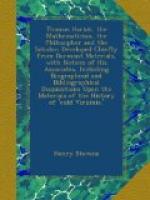The results however are contained in this little volume, which has expanded day by day from the original limit of fifty to above two hundred pages. From a concise bibliographical essay the work has grown into a biography of a philosopher and man of science with extraordinary surroundings, wherein the patient reader may trace the gradual development of Virginia from the earliest time to 1585 ; I especially,’ says Strachey, I that which hath bene published by that true lover of vertue and great learned professor of all arts and knowledges, Mr Hariots, who lyved there in the tyme of the first colony, spake the Indian language, searcht the country,’ etc ; Hariot’s nearly forty years’ intimate connection with Sir Walter Raleigh; his long close companionship with Henry Percy ; his correspondence with Kepler; his participation in Raleigh’s `History of the World;’ his invention of the telescope and his consequent astronomical discoveries ; his scientific disciples ; his many friendships and no foeships ; his blameless life ; his beautiful epitaph in St Christopher’s church, and his long slumber in the ‘garden’ of the Bank of England.
The little book is now submitted with considerable diffidence, for in endeavouring to extricate Hariot from the confusion of historical ‘facts’ into which he had fallen, and to place him in the position to which he is entitled by his great merits, it is desirable to be clear, explicit and logical. A decision of mankind of two centuries’ standing, as expressed in many dictionaries and encyclopaedias, cannot be easily reversed without good contemporary evidence. This I have endeavoured to produce.
Referring to pages 191 and 192 the writer still craves the reader’s indulgence for the apparently irrelevant matter introduced, as well as for the inartistic grouping of the many detached materials, for reasons there given.
It ought perhaps to be stated here that the book necessarily includes notices, more or less elaborate, of very many of Hariot’s friends, associates and contemporaries, while others, for want of space, are mentioned little more than by name.
The lives of Raleigh, and Henry Percy of Northumberland, Prisoners in the Tower, seem to be inseparable from that of their Fidus Achates, but I have endeavoured to eliminate that of Hariot as far as possible without derogation to his patrons. All the new documents mentioned have their special value, but too much importance cannot be attached to the recovery of Hariot’s Will, for it at once dispels a great deal of the inference and conjecture that have so long beclouded his memory. It throws the bright electric light of to-day over his eminently scholarly, scientific and philosophical Life. By this and the other authorities given it is hoped to add a new star to the joint constellation of the honored Worthies of England and America.
Henry Stevens of Vermont
Vermont House, xiii Upper Avenue Road,
London,
N.W. April 10 1885




